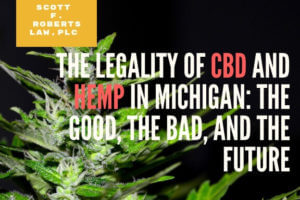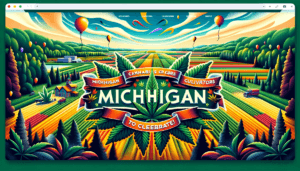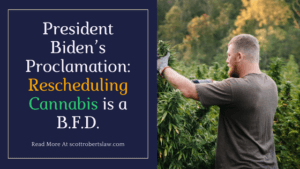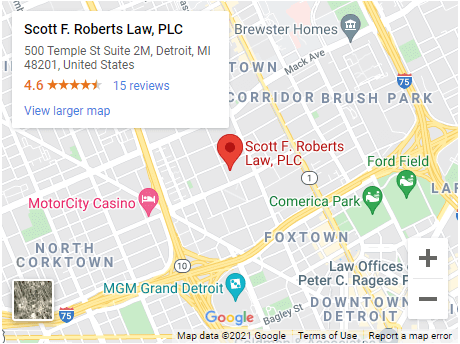Due to legal and regulatory changes in the industry, including the 2018 Farm Bill and recent changes in the implementation of Michigan’s 2014 Industrial Hemp Research Act, the information contained in this Article may no longer be accurate. Please contact an attorney before relying on any information contained in this Article. For more information on cultivating hemp, or the Hemp Pilot Program in Michigan, check out our recent article.
If you are reading this, you probably already know a good deal about CBD. However, you probably have the same question as many of our clients, is it legal to make and sell CBD in Michigan. The answer? “It depends.”
As practicing CBD and Hemp Attorneys, “it depends” is an all-to-common answer for questions involving CBD and medical marijuana. However, this article will be an in depth analysis of the current state of affairs with regard to CBD production and sale in Michigan and is meant to provide more context to this all-to-common attorney answer.
The Bad News
Michigan’s administrative guidance on legality of CBD is in line with the DEA’s guidance on this issue. LARA’s guidance state’s that “any extracts of marihuana or extracts of the marihuana plant will continue to be treated as marihuana.” LARA’s reasons are straightforward—because CBD can only be manufactured using marijuana or industrial hemp, and the state has not granted any industrial hemp manufacturing licenses, CBD regulation must fall under Michigan’s medical marijuana laws. In other words, LARA wants to regulate CBD as a controlled substance the same as it regulates marijuana.
CBD can only be manufactured using marijuana or industrial hemp, and the state has not granted any industrial hemp manufacturing licenses, CBD regulation must fall under Michigan’s medical marijuana laws. In other words, LARA wants to regulate CBD as a controlled substance the same as it regulates marijuana.
On the federal level, the DEA has stated that CBD is regulated as a controlled substance. There is one major caveat being: CBD derived from hemp grown in compliance with state and federal law is legal. According to the DEA, as long the hemp is grown in compliance with federal hemp laws, “such products may accordingly be sold and otherwise distributed throughout the United States without restriction.” Parroting that stance is Michigan’s hemp research statute, which defines industrial hemp as Cannabis Sativa with less than 0.3% THC. There is no qualifier in the definition for where or what purpose the CBD was produced. Most importantly for legal purposes, the second to last sentence of Michigan’s guidance on CBD states: “Marihuana does not include industrial hemp grown or cultivated (or both) for research purposes under the industrial hemp research act”.
Another piece of bad news is that the current administration in charge of the executive branch of the federal government seems to not care about the actual legal status of CBD. One CBD producer out in Colorado—Pure Spectrum—reported that the U.S. Postal Service refused to ships its products, even after they established that the products were produced in compliance with federal laws.
Loopholes and the Law
This potentially leaves a glaring hole in LARA’s blanket CBD ban – CBD legally produced from industrial hemp outside of Michigan in compliance with federal and that state’s industrial hemp programs authorized under the 2014 Farm Bill. Out-of-state CBD produced in a state with a federal law compliant industrial hemp bill—e.g. Tennessee, Colorado, Kentucky and California—could therefore likely be legally sold by Michigan retailers and wholesalers. The flip side of this is that any CBD produced in Michigan would be regulated like Marijuana because the state’s hemp laws do not currently authorize commercial industrial hemp production. Instead, they merely authorize hemp production for research purposes.
While such a hole is good for those that would sell CBD products, it puts Michigan CBD producers at a huge disadvantage. They cannot currently grow industrial hemp to produce CBD because Michigan has not approved any commercial “pilot programs.” For those that do produce CBD from marijuana, they are relegated to selling exclusively to Michigan residents with a MMMP card, which is less than 2.5% of Michigan’s population. Even more problematic for CBD producers in Michigan is the fact that the CBD produced under the MMMA or MMFLA is not cost competitive with CBD derived from commercial hemp. This type of stranglehold placed on Michigan CBD producers prevents them from competing in the growing national and international CBD market.
For now this legal gray zone is where CBD exists in Michigan. The gray zone was only discovered by a close reading and analysis of current state and federal law. As CBD and hemp attorneys, the best we can do for CBD products and production is tell you where the State and DEA have drawn the lines, and where the spaces between those lines present an opportunity for you.
Sellers of CBD products can operate but need to be thorough in their research. “Caveat Venditor” is Latin for, “let the seller beware”, and in the legal world it is usually relegated to contracts and property issues. However, when dealing in the legal minefield that is Michigan CBD law, CBD retailers in Michigan need to make sure their products are sourced from appropriate vendors. This means checking out the CBD producers to make sure they are actually operating in accordance with state and federal hemp laws. Otherwise, sellers open themselves up to prosecution on the state and federal level. Producers of CBD in Michigan, on the other hand, are relegated to a fraction of the market. They must operate in accordance with the MMMA and MMFLA, which are clearly defined in their parameters, but do not present to producers the same avenue for profit and growth as out of state producers.
For in state producers and sellers, the risk of government overreach still exists. The fact that a valid legal defense exists has not stopped state action in the past. In Tennessee, “Operation Candy Crush” resulted in the arrest of 21 store owners in connection with the sale of CBD products. The arrests and charges were all dropped when it could not be proved that the sale of CBD products was actually illegal under state law. This type of overreach is a possibility with the current status of Michigan’s CBD laws.
The Future—Hemp Bills Being Considered
Currently there are three bills in front of the Michigan House of Representatives. The bills all address the classification of industrial hemp and how it will be categorized going forward. The bills are numbered as follows; HB 6330, HB 6331 and HB 6380. 6330 and 6331 were introduced on the 25th of September, 2018, while 6380 was introduced on the 26th.
HB 6330 aims to change the name of Michigan’s Industrial Hemp Research Act to the Industrial Hemp Research and Development Act. Additionally, the bill would also update the definition of industrial hemp. The expanded definition would include viable seeds of the plant and all derivatives, extracts, cannabinoids, isomers, acids, salts and salts of isomers. The bill would also amend the act by adding several new sections. The most important and notable of which would require the Michigan Department of Agriculture and Rural Development to establish grower and processor-handler licenses, which would apply to all person 18 years and older growing industrial hemp in Michigan.
The specific language of the bill does expressly give growers the ability to sell industrial hemp to medical marijuana facilities under the MMFLA. The bill makes no mention of whether CBD related products could be sold outside of the boundaries and requirements of the MMFLA. However, the expanded definition and ability to license outside of Colleges and Universities does seem like a promising shift, though the bill expressly requires that growers and processors also submit a “research plan” with their applications.
HB 6331 is far less dense and is focused on the definition of industrial hemp. The definition would match the definition proposed in HB 6330. However, this bill would update industrial hemp’s definition within the Public Health Code. The bill would clarify the Public Health Code to make crystal clear that industrial hemp grown, processed or handled under Michigan’s industrial hemp laws would not be considered marijuana. What does this mean? It means that industrial hemp and products made from it would not, under the Michigan Public Health Code, be considered marijuana—as long as they are made in accordance with the Industrial Hemp Research and Development Act. Sound familiar? It should as this language almost exactly echoes the language used in the 2014 Farm Bill referenced above.
HB 6380 is a bill focused on amending the MMFLA to exclude industrial hemp from the definition of marijuana plant for purposes of the Act. HB 6380 would also require that LARA make and set rules by the March 1st, 2019. The rules would establish standards, procedures and requirements for the sale of industrial hemp from a provisioning center to a registered patient. This bill attempts to contrast industrial hemp with marijuana, but is really just a call for an action plan when it comes provisioning centers and industrial hemp. It is hard to decide what to make of this bill. The previous HB 6330 and 6331 seemed to follow in line with the federal Farm bill while HB 6380 seems to tie the legality back to the MMFLA.
The Future—The Michigan Regulation and Taxation of Marihuana Act
The ballot initiative to “regulate marijuana like alcohol”, also known as the Michigan Regulation and Taxation of Marihuana Act or MiLegalize ballot initiative, specifically addresses the issue of hemp production. If passed, the RMLA would allow for the commercial cultivation of industrial hemp in Michigan as well as legalize the sale of products derived from industrial hemp in Michigan. This could help put the state back on equal standing with other states that have taken the lead on hemp and CBD production.
There could be a snag, however. While the RMLA legalizes and authorizes the growing of hemp and processing and sale of hemp derived products such as CBD, it also gives LARA the authority to issue rules “to regulate the cultivation, processing, distribution, and sale of industrial hemp.”
Here, we hope LARA exercises a “light touch” when it comes to regulating hemp and CBD production. With the state already years behind other states in terms of hemp and large-scale commercial CBD production, the last thing we need is more regulations to tie the hands of Michigan businesses looking to gain equal footing with other CBD producers. Even more concerning, is the fact that production under new recreational laws, may not be considered a “pilot program” under the Farm bill. Without the fix being proposed by HB6330, however, hemp production under the MRTA would still be illegal under federal law. However, this would still be a step forward for prospective Michigan hemp and CBD businesses since it would open the door to all Michigan CBD consumers, as opposed to just those with an MMMP card.
The MRTA also has the potential to put Michigan hemp and CBD producers on equal footing with their out-of-state competitors, especially since the new hemp laws being proposed provide the additional fix that would bring Michigan commercial hemp production in compliance with federal law.
As a result, the MRTA would be a much needed shot in the arm for CBD and hemp producers in Michigan. This initiative will carve out a place for CBD in our laws that is not reliant on loophole legality and greatly expand the market for Michigan CBD producers.
Side note: Make sure you get out and vote in November!
CBD and Hemp Under Current Laws
While the future may be bright for Michigan CBD production, there are state laws that currently allow for the production and sale of CBD. Below is a recap of the state’s current Marijuana laws that could be used to legally produce CBD, as well as an explanation on how the state’s ballot proposal could be a game changer for Michigan CBD businesses.
CBD Under the MMMA
Michigan currently has two laws that would provide protection for the production and sale of CBD, but only under certain circumstances. The first law is the Michigan Medical Marihuana Act, or MMMA, which has been around since 2008. This law allows the sale of Marijuana from a registered caregiver to their patient. Because CBD is arguably considered to be legally the same as Marijuana, the protections in the MMMA for the sale of Marijuana also apply to CBD. That means that caregivers in Michigan can legally sell CBD produced from Michigan Marijuana to their patients.
Technically, this only protects the sale of CBD to one of the caregiver’s registered patients and would not protect caregiver-to-caregiver sales or sales from a caregiver to another caregiver’s patient. In practice, however, caregiver-to-caregiver transactions and sales to other patients are common and the court cases prohibiting them rarely enforced. Thus, the MMMA would provide some practical protection for producers and sellers of CBD, even where the law does not technically provide for the type of production and sales that are common in the CBD market.
CBD Under the MMFLA
Next Up? The Medical Marihuana Facilities Licensing Act, or MMFLA. The MMFLA authorizes the commercial-scale growing and processing of Marijuana, meaning it would also authorize the large scale growing of Marijuana for CBD production and the processing of CBD and other cannabinoids such as THC and CBN. I’ve met many growers who plan on taking advantage of the MMFLA to produce CBD-only products as well as high-CBD Marijuana products.
The problem with this law is that it would only authorize the sale of CBD to patients registered under the Michigan Medical Marihuana Program, or MMMP. Because the MMFLA only allows certain licensed provisioning centers to sell Marijuana products to patients, and only licensed processors to produce CBD products, the MMFLA still imposes severe restrictions that make it uneconomical compared to other methods of production and sale. While there are hundreds of thousands of MMMP patients in Michigan, these patients represent only a fraction of the millions of potential CBD customers in Michigan.
CBD Under the IHRA
That brings us to the Industrial Hemp Research Act. The problem with this law is that Michigan currently has not issued any IHRA Hemp production licenses. This is not because Michigan is discouraging potential license holders—according to LARA officials, there simply has not been much interest in hemp research licenses. The reason for this is that the IHRA is limited to research facilities.
We looked into this issue for a client of ours and were somewhat surprised with how cooperative and even enthusiastic LARA officials were in going through the process to issue an IHRA license. We also learned that there is no official process in place for issuing these licenses. While this can be either a good or bad thing depending on the situation, given LARA’s interest in issuing a license under this program, this law could provide protection for CBD produced from hemp, but only to those that do so in conjunction with a college or university. The IHRA also does not authorize the sale of products derived from the growing of hemp “for research purposes.” Moreover, with most colleges and universities unwilling to jump into the political minefield that is CBD and medical marijuana regulation, it is not surprising that no licenses have been issued under this law.
The Bottom Line
Michigan commercial CBD producers can only currently produce CBD in compliance with the state’s medical marijuana laws—the MMMA and MMFLA. If and when the 2018 ballot initiative passes, however, Michigan companies would be able to derive CBD from state-legal, commercially grown industry hemp and sell these products to all Michigan residents, not just those with an MMMP card. This could allow Michigan businesses to profit from the lucrative and fast growing CBD market.
As one of the only CBD and Hemp attorneys in Michigan writing on the legalities of CBD, our law firm is committed to assisting you in navigating current and future state and federal laws. If you are currently selling CBD products, want to sell CBD products or are interested in CBD production, contact the CBD and Hemp lawyers at Scott F. Roberts Law, PLC to schedule a consultation. Please note that due to the high demand for such consultations, there is a $50.00 consultation fee for all CBD and commercial hemp related consultations.




